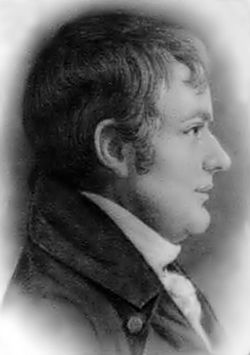Henry Bradford married Sarah Crowell, daughter of Edward and Martha Rayburn Crowell, on 1 Jan. 1782. The ceremony was performed by a friend of the Bradford family, the Reverend Francis Asbury. Henry and Sally, as she was known to her friends and relatives, made their home near Enfield on the land given to Henry by his father. The union produced ten children and many descendants, most of whom now live outside North Carolina.
Bradford did not share his father's love for military life or politics, even though he had seen service as a private in the Revolutionary War. His leaning, for which the acquaintance with Francis Asbury was undoubtedly responsible, was toward the Methodist Episcopal church. Although he was never ordained by the church, Bradford frequently preached to the people in the area around Enfield, gaining for himself a reputation as a competent minister. Even Bishop Asbury, who visited the local church in 1802, complimented Bradford for his work in behalf of Methodism.
By the late eighteenth century, Bradford had a regular congregation attending his sermons, which, prior to the erection of the first house of worship, were camp meetings held on his land near Enfield. Temporary log huts in the arbor provided shelter from inclement weather. A building called Bradford's Meeting House was completed about 1790, and a few years later the congregation had grown large enough for incorporation into the Methodist Episcopal Church in America.
During the first quarter of the nineteenth century, concern for reform within the Methodist Episcopal church provoked internal quarrels and led to schisms within the church body. Bradford supported the movement for change and demonstrated his activism by joining the Roanoke Union Society, an organization formed for serious consideration of reform measures within the Methodist church. Bradford hosted three meetings of the society in 1824 and 1825, despite its censure as a subversive group by the church hierarchy. A few years later, Bradford was among a group of ministers called to appear before the board of bishops for activity in the Roanoke Union Society and for patronizing Mutual Rights, a publication advocating church reform. In December 1828, Bradford was a delegate to the assembly that created the Methodist Protestant Church in North Carolina. He immediately joined the annual conference and began riding the Roanoke Circuit from his home near Enfield.
Bradford continued his work for the Methodist Protestant church until his death. His widow left North Carolina to live with her son Richard in Florida, where she died five years later.
Henry Bradford married Sarah Crowell, daughter of Edward and Martha Rayburn Crowell, on 1 Jan. 1782. The ceremony was performed by a friend of the Bradford family, the Reverend Francis Asbury. Henry and Sally, as she was known to her friends and relatives, made their home near Enfield on the land given to Henry by his father. The union produced ten children and many descendants, most of whom now live outside North Carolina.
Bradford did not share his father's love for military life or politics, even though he had seen service as a private in the Revolutionary War. His leaning, for which the acquaintance with Francis Asbury was undoubtedly responsible, was toward the Methodist Episcopal church. Although he was never ordained by the church, Bradford frequently preached to the people in the area around Enfield, gaining for himself a reputation as a competent minister. Even Bishop Asbury, who visited the local church in 1802, complimented Bradford for his work in behalf of Methodism.
By the late eighteenth century, Bradford had a regular congregation attending his sermons, which, prior to the erection of the first house of worship, were camp meetings held on his land near Enfield. Temporary log huts in the arbor provided shelter from inclement weather. A building called Bradford's Meeting House was completed about 1790, and a few years later the congregation had grown large enough for incorporation into the Methodist Episcopal Church in America.
During the first quarter of the nineteenth century, concern for reform within the Methodist Episcopal church provoked internal quarrels and led to schisms within the church body. Bradford supported the movement for change and demonstrated his activism by joining the Roanoke Union Society, an organization formed for serious consideration of reform measures within the Methodist church. Bradford hosted three meetings of the society in 1824 and 1825, despite its censure as a subversive group by the church hierarchy. A few years later, Bradford was among a group of ministers called to appear before the board of bishops for activity in the Roanoke Union Society and for patronizing Mutual Rights, a publication advocating church reform. In December 1828, Bradford was a delegate to the assembly that created the Methodist Protestant Church in North Carolina. He immediately joined the annual conference and began riding the Roanoke Circuit from his home near Enfield.
Bradford continued his work for the Methodist Protestant church until his death. His widow left North Carolina to live with her son Richard in Florida, where she died five years later.
Inscription
Rev. War Soldier, Methodist Minister and Educator
Family Members
Advertisement
Explore more
Sponsored by Ancestry
Advertisement










